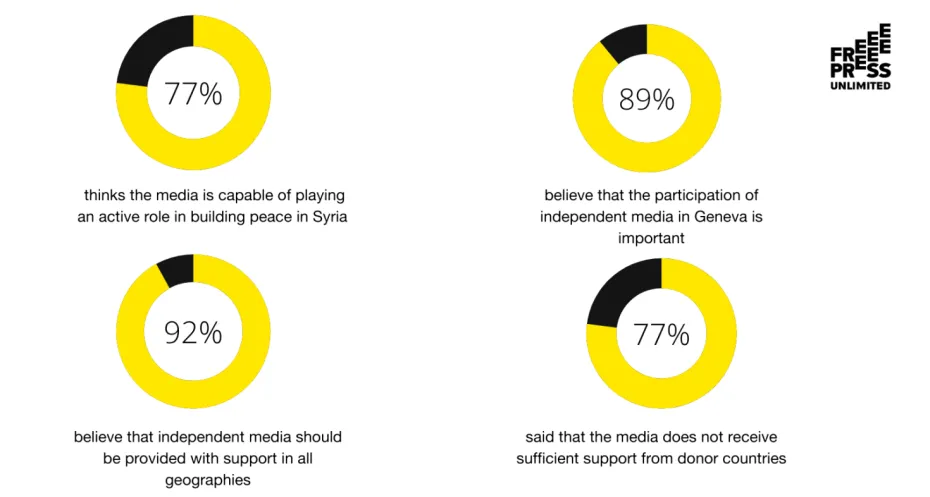Panel discussion Syria: “We should stop seeing each other as opposite sides”

As part of the VI Brussels Conference on “Supporting the future of Syria and the region” on 9-10 May 2022, Free Press Unlimited organised an online panel discussion focused on the role of independent media in peace building in Syria.
انتقل للأسفل للحصول على النسخة العربية
During the panel discussion, Syrian independent media, CSOs and EU representatives talked about the importance of independent media in peace building, the political process, and the need for having independent media to build cohesion. The panelists discussed openly and honestly about the different conditions they are working under.
Many challenges
Throughout the discussion, the difference in access to resources, tools and opportunities became clear. Amera Malek, Founder and General Director at MAUJ Foundation, said that many media outlets and individual journalists residing in the territories of the Syrian government are committed to the idea of building peace in Syria. However, these outlets and journalists either lack the tools and the training to go ahead with such a mission, or are put under pressure to follow certain agendas.
According to Jawad Sharbaji, co-founder and Editor-in-Chief at Enab Baladi Newspaper and Website, Syrian independent media outlets are in dire need to diversify financial resources. “Depending on one main financier puts pressure on these outlets to follow a certain agenda, something that puts their independence at stake and diminishes their role in fighting propaganda.”
Despite obstacles, achievements are made
Jawad ensured that ‘we shouldn’t underestimate what independent media have achieved so far, given the fact that it is still “newly born”. Jawad emphasized that the independent media had a role in changing the discourse of the governmental media, stressing that “The awareness of the audience is now higher”. Ghoussoun Abo Al-Dahab, President of the Board of Directors- Ethical Charter for Syrian Media, indicated that success has been achieved to some extent through the establishment of the Syrian Ethical Charter, which contributed to building an independent ethical media that took upon itself the task of changing the media landscape. Ghoussoun stressed that the decline in the number of signatories to the charter is mainly due to financial reasons, and that the independent media exists and is capable of making a difference, provided that it receives appropriate support.
Shirin Ibrahim, Manager of Arta Radio, emphasized that the training and support received by the media outlets in northeastern Syria contributed to building capacities, and that the media have the ability to highlight the importance of peace building and educate people about the consequences of war. This underlines the need to provide support to the independent media and enable it to exercise its effective role in peace building.
Media can shape the future
The panelists agreed that media that work professionally, independent, and across dividing lines can build cohesion. There is a potential for independent media to shape the future of Syrian society by building cohesion across all geographies, providing access to independent and credible information, enabling public debate and combatting hate speech, fake news, and misinformation.
Amera Malek noted that the media is able to dismantle the economy of conflict. “If we want to have a solution we should stop seeing each other as opposite sides. At the moment we have a knowledge-gap between the media inside Syria and outside Syria.”
Suhaib Anjarini, independent journalist and researcher, said that media outlets in the governmental territories are confronted with the challenge of control by the authorities, in addition to facing many complications in receiving a license. “Although many media outlets have to commit to what the authorities want,” Anjarini said, “there are many independent journalists that do work independently, sometimes using nicknames.” According to Anjarini, we need to help and support these journalists and not ignore them, given that helping them means helping ourselves. “The current situation is very dark; however, we need to work on solutions and pretending that such journalists do not exist in the governmental territories will not help,” he concluded.
As a representative from the EU, Daniel Aristi Gaztelumendi, Head of Division for the Middle East and North Africa Directorate at The European External Action Service (EEAS), believes that the Syrian independent media “create space for alternative narratives for researchers, activists and human rights activists. Syrian independent media open the window to connect Syrians to international development.” He also said that the EU remains committed to support in this.
Read more
-
Audience research in Syria
-
EU remarks after the event
.انقر هنا للحصول على النسخة العربية
This programme is funded by the European Union and the Swedish Development Agency. The content of this article is the sole responsibility of Free Press Unlimited and do not necessarily reflect the views of the European Union or the Swedish Development Agency


